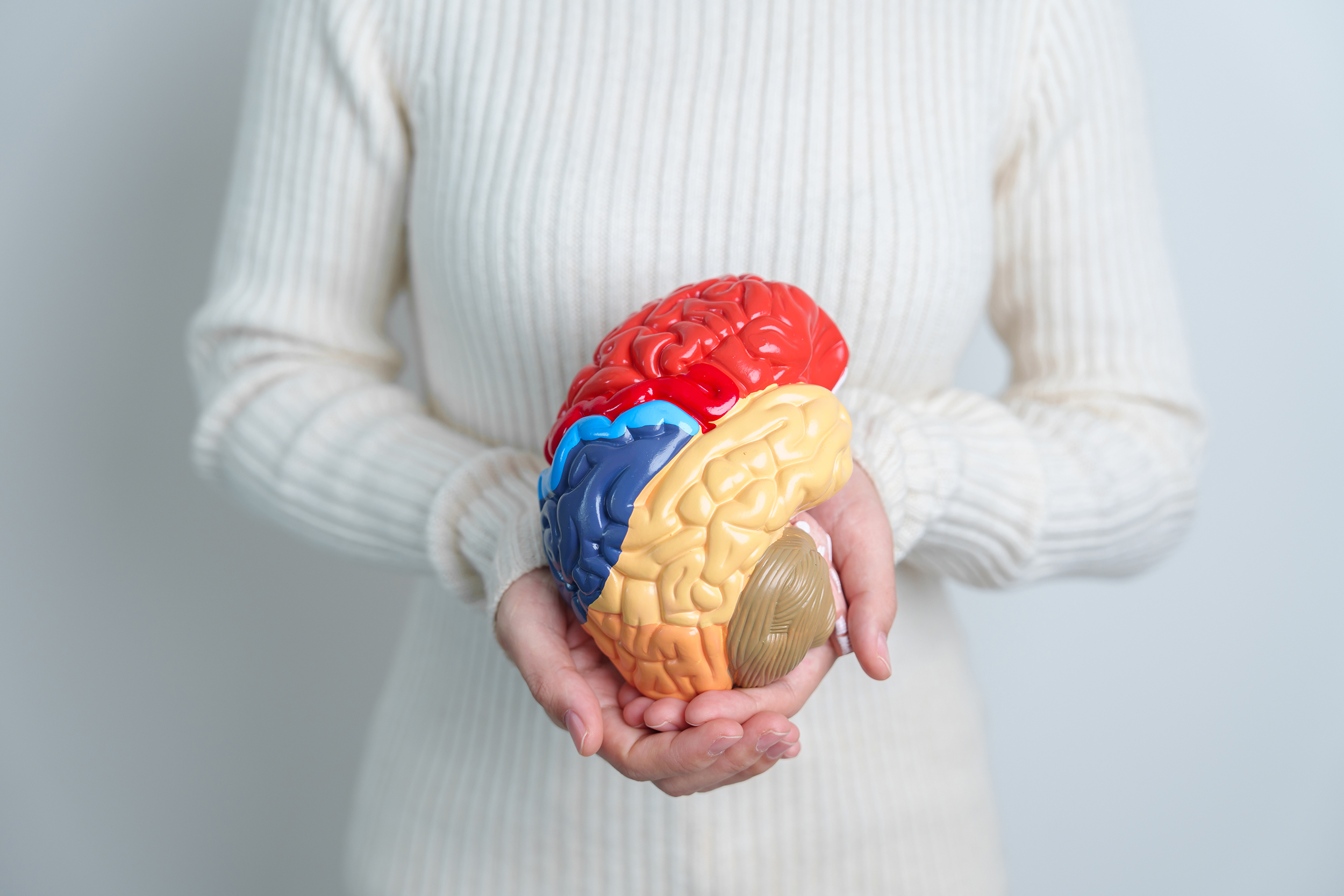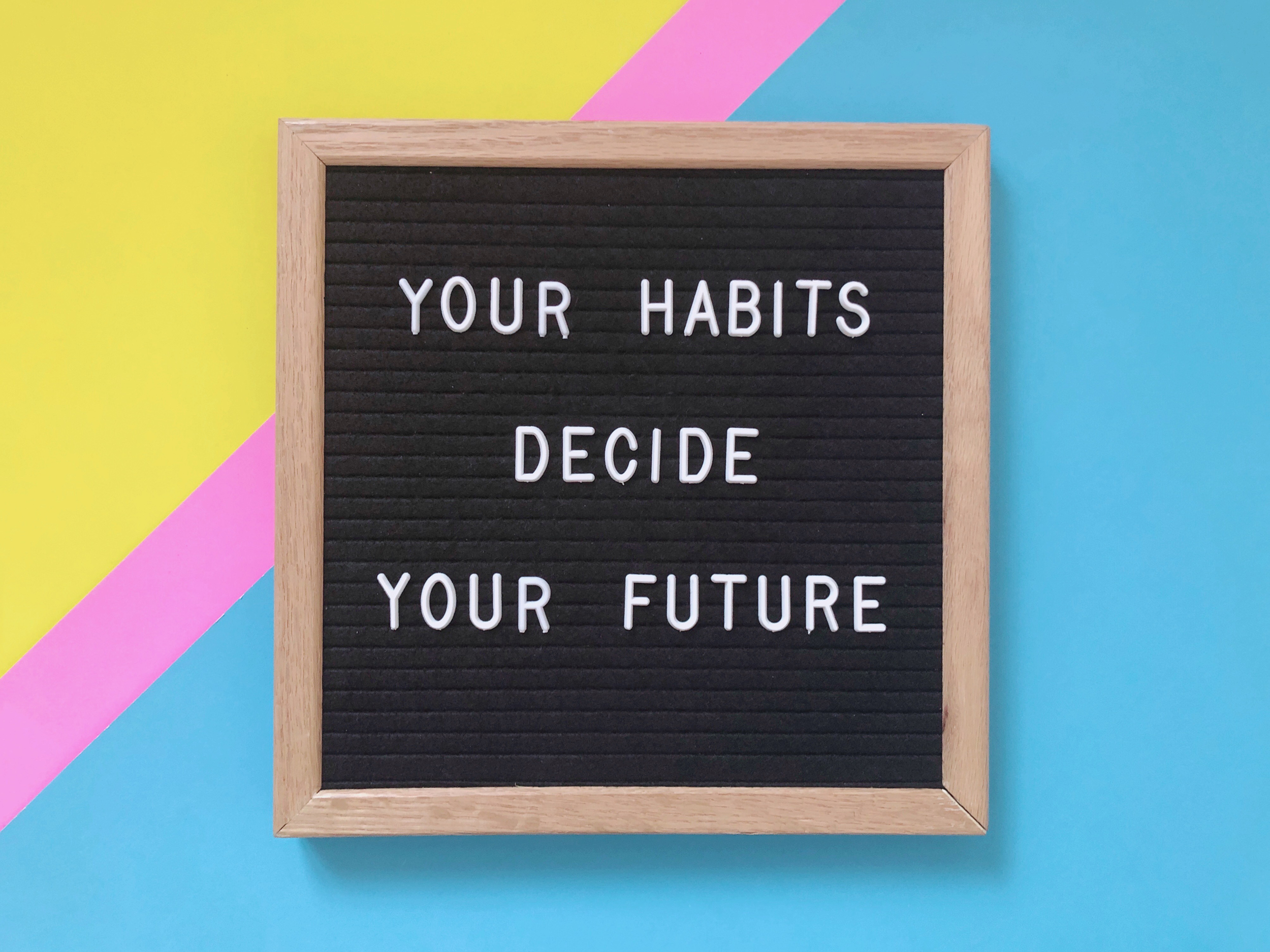
Idunnu Oke
January 15, 2026
•
9 min read time

In a world where stress has become an epidemic and for many, it seems extremely difficult to overcome daily overwhelm, the routines we build quietly shape how we feel, think, and respond to life.
Can you control the stressors life throws at you? Maybe not. But you can build habits that help you stay resilient.
Habits—those small, repeated actions—might seem simple on the surface, but they are powerful building blocks for overcoming mental health conditions.
Building mental wellness habits is essential in creating a routine that actually sticks and creates lasting change.
Ready to explore what truly makes change stick? This blog explores what habit formation is, the science behind it, and how it can improve your mental wellbeing.
When you're stressed, your brain doesn't just feel different—it literally shrinks. The prefrontal cortex (your willpower center) goes offline while your ancient survival brain takes control.
This is why you can plan the perfect evening routine but find yourself scrolling social media instead when 9 PM arrives. Your stressed brain has hijacked your best intentions.
Habit formation is the driving force behind building new habits. It's a mechanism that establishes certain habits through repeated and continuous behaviors over time.
Habits require consistency to form. This is why someone who's been to the gym only 5 times hasn't formed the habit yet. Compare this to someone who has been consistently going to the gym for a whole year; they've developed automatic, established routines.
Interestingly, when habits become reflexes, they become automatic and seamlessly part of our daily lives. According to research from the Society of Personality and Social Psychology, 40% of our daily activities are driven by repeated behaviors, occurring almost in the same situations.
For example, checking your phone immediately when you wake up, journaling before you go to bed, creating your to-do list by 6:00 am, grocery shopping every Friday, or practicing meditation first thing in the morning are habits that you do almost unconsciously and effortlessly.
Habit formation begins with associative learning, which starts with a cue and can be referred to as a trigger or event that elicits certain behaviors.
For instance, if you come home from work every day, you feel stressed, and because you live alone in your apartment, you hardly have anyone to share or vent to about how work went, the growth you're experiencing, and the challenges you're facing. Every time this happens, you reach for your journal. You write about your day before going to bed.

Then, as time goes on, your brain associates stress with journaling, and the more you keep up with this practice, the more of a journaling habit is formed.
Furthermore, the associative pathway then progresses to the automatic path.
Automatic habits require less conscious effort to keep repeating behavior. Habits are kept on autopilot; for example, you'll automatically journal every night without thinking about it.
Associative and automatic habits work together to make you establish healthy habits, build resilience, and stay motivated.
Likewise, developing healthy routines works by having a cue that triggers behavior that supports your mental health, consistently following a specific pattern, and creating a mental wellness routine.
Moreover, habit formation is engineered through our brains building neural connections that make it easier for us to do things automatically. Some hormones and reactions support the habit formation process in the brain. Let's take a critical look at the science behind habit formation.
The basal ganglia are brain structures located near the base of the forebrain that play a key role in habit formation.
One significant component of the basal ganglia is the striatum, which plays a huge role in coordinating information between various brain areas and the basal ganglia.
The striatum, particularly the dorsolateral striatum, helps form reward-motivated behaviors.
Usually, habits motivated by reward start from goal-oriented actions. However, over time, these reward-guided behaviors can eventually turn into stimulus-induced actions that are less focused on any form of outcome.
With the basal ganglia being the principal of reinforcement learning, the striatum works to ensure learned behaviors become fixed and turn into habits.
Likewise, the striatum works hand-in-hand with the substantia nigra to activate the release of the neurotransmitter dopamine, which is a crucial component of the basal ganglia's functionality.
Dopamine, also one of the "feel-good hormones," triggers feelings of pleasure and excitement through the reward and motivation mechanism, which further establishes reinforcement and habit formation.
When you engage in activities that give you pleasure, e.g., eating your favorite snack, drinking coffee in the morning, or taking an afternoon nap, the reward system of the brain causes an increased release of dopamine that indulges you, makes you feel good, and continues to prompt you to repeat that behavior over and over again.
Through this process, repeated actions gradually become automatic habits.
Now that you understand the science, let's explore the link between habit formation and mental health.

Here's what the self-help industry won't tell you: most habit advice assumes you're starting from a neutral mental state. But if you're dealing with anxiety, depression, or chronic stress, you're not starting from zero—you're starting from negative ten.
Habits can either impact your mental health positively or negatively. Finding the proper coping mechanism when faced with stressful situations can be challenging.
This is the cruel irony: the more you need healthy habits, the harder they become to form. Your stressed brain craves instant relief, not long-term solutions.
For instance, it's easy to adopt habits like overeating, smoking, oversleeping, doom scrolling, or social withdrawal in seasons of extreme stress.
Here's an example. Imagine you've had a rough Saturday: doing the laundry, folding clothes, cooking meals in batches, grocery shopping, brainstorming ideas for the next batch of videos you plan to shoot, and dealing with money stress!
You're stressed, so your brain reaches for a snack - chocolates, ice-cream sandwiches, or a donut. It doesn't just end there. The problem escalates when this eating becomes excessive and uncontrolled, and then you make a habit out of this.
Stress management could lead to behaviors that create poor habits that negatively influence your mental health, which further aggravate your stress level, such as anxiety and depression.
According to the Mental Health Foundation, 46% of individuals admitted that they ate too much or unhealthily during stress.
The American Psychological Association also reports higher stress levels for frequent fast-food eaters. A strong link exists between habits cultivated during stressful events and our mental wellbeing.
Forming good and healthy habits for your mental health, like mindfulness, journaling, or social media detox, would strengthen emotional resilience, improve moods, and enhance emotional regulation.
Creating a mental wellness routine would accelerate building supportive practices and assist you in keeping structure in place for your daily mental wellbeing.
With routines, you're creating a system of predictability, a pattern for your brain to follow, which reduces spikes in stress levels.
But here's where it gets interesting—understanding why creating a mental wellness routine gets difficult.
You may consistently fail at every routine you try to keep in place. Or you feel like routines are not your thing. Several common factors can derail your mental wellness routine. Here's what typically goes wrong:

This could be due to your past experiences of not being provided a structure of consistency while growing up, during school, or during the holidays. You lived life and made decisions as they came.
Working with a routine now could feel extremely challenging because you're unfamiliar with the consistency process.
Building mental wellness habits doesn't happen once or become prominent in a rush.
In fact, a 2009 study by Dr. Phillippa Lally proves that a new habit is formed between 18 and 225 days, and a new behavior takes an average of 66 days to be formed.
Nonetheless, this could vary based on the different habits being formed.
Having an underlying mental health issue like anxiety, depression, or eating disorders can pose a challenge to sticking to routines.
It would be even harder when these mental health symptoms overwhelm you. For instance, depression could cause less motivation towards starting a mental wellness routine.
Anxiety could lead to continual disruptions in keeping up with daily routines. Experiencing a frequent level of mental distress also gives no room to follow the structure you have put in place for habit formation.
However, it's not impossible to achieve developing healthy routines.
Healthy habits also mean applying proven and workable principles in achieving your goals. Here are six practical ways to build healthy habits that support your mental health:
To build long-lasting habits, you have to define your objectives clearly. What kind of habits are you intentional about cultivating? What outcome do you have in mind?
When you set clear objectives, you can pinpoint the habit you want to develop, measurable goals, actionable steps to achieve your goals, and the accurate behaviors that'll foster the habits.
For instance, you want to cultivate a habit of practicing meditation daily. Instead of saying "I will be meditating daily," you could say, "I want to calm my racing thoughts and improve my focus by meditating for 10 minutes every morning before checking my phone."
With this approach, you can appoint specific timelines and stick with a particular routine until the habit is formed.
Try this: Write down one specific mental health goal and the exact habit that will help you achieve it.
In the process of building supportive practices, don't rush the process.
Don't overwhelm yourself with more than you can handle at a time. Remember that your routine should fit around your other commitments. Consider your work schedule, family time, school, and social activities.
Starting small would ensure that you are consistent and can complete your daily routine. If 30 minutes daily won't work, you can opt for 10 to 15 minutes.
Likewise, acknowledge those little steps and gradually grow from where you are. You can increase the time you dedicate to habit formation as you progress.
Try this: Choose a habit so small it seems impossible to fail—like writing one sentence in a journal.
Because habits get reinforced with reward, it's imperative to support the brain's reward system by rewarding yourself after you have completed a task, e.g., going on a solo date after you've completed your weekly meditation goals.

With the cue-routine-reward system, you can sustain a habit loop. Here's how it works:
A cue triggers the brain into action, whether external or internal. It's like giving your brain a signal to perform a particular action. A cue then graduates into a routine that keeps going on and on.
If your cue for journaling is stress, you are automatically on a journaling routine because you are exposed to stressful events. From a routine, your habits lead to reward.
When you practice rewarding yourself after engaging in a habit, you are giving yourself more motivation to practice repetition.
Try this: Pick a small reward you can give yourself immediately after completing your habit.
Creating supportive practices requires that you let go of harmful and toxic habits that hinder you from successfully creating a mental wellness routine.
Start by identifying habits that harm your mental wellbeing. Brightn AI chat makes this process easier by helping you recognize patterns you might miss on your own, contextualizing past behaviors like self-sabotage, procrastination, or excessive social media usage.
With Brightn, you are not only provided with a journaling tool but can also get more insights on building new and better habits.
The app will help you identify behaviors that trigger toxic habits, how your moods influence them, and the external factors that keep contributing to those negative habits.
Indicating the wrong habits and their triggers will help you build new and healthy ones!
Try this: List three habits that negatively impact your mental health and identify what triggers them.
When you are consistent, you can be sure of establishing a habit that is automatic and repetitive.
While you are consistent, also be detailed. This means you are repeating the same behavior under the same conditions simultaneously.
Practicing a habit consistently with the same cue and routine makes a habit stick faster. This could mean creating a routine of journaling using the Brightn app every morning and evening for the next six months for 10 minutes.
You'd realize that journaling in the morning and evening would have become unconscious, unpremeditated, and pleasurable.
Try this: Set a specific time and location for your new habit and stick to it for one week.
Motivation gets more enriched when you can notice significant changes in your habits.
Tracking your progress helps you understand whether your routine is helping, how your new habits positively influence you, and how consistent you are.
You can do this through a habit tracker journal, calendar reminders, spreadsheets, a daily reflection notebook, or mental wellness apps that support habit formation like Brightn.
Try this: Choose one method to track your habit and commit to using it for 30 days.
Research shows it takes an average of 66 days to form a new habit—but mental health habits can take up to 254 days because they're working against stress responses and emotional patterns. The key is patience and consistency, not perfection.
Building your habits on a solid foundation makes their impact long-lasting and effective. If you've been experiencing mental health symptoms such as anxiety, depression, restlessness, or racing thoughts, creating supportive practices can always keep you afloat.
Healthy habits safeguard you and serve as support during trying times. They ensure you have a soft and solid landing when your mental health gets rough.
Because the habits you cultivate using a mental wellness routine are stress-relieving, you can bounce back and manage stress appropriately even during highly stressful moments.
Suppose you struggle with mood disorders and unstable moods. In that case, these habits help create an environment that allows you to prioritize your mental wellbeing, stabilize your moods, and even alleviate symptoms.
Your mental health greatly influences your body. Research proves that mental health challenges may aggravate physical health. A recent statistic shows that out of those who experience severe mental health challenges, 37.6% have long-term physical conditions.
With healthy habits, you can experience more positive emotions, which leads to a strong immune system; developing healthy routines aids in improving your diet and securing a healthy sleeping lifestyle.
Sticking to your routine keeps your energy level in good condition, lowers the risk of diseases, and fosters physical fitness.
When your moods are stable, you can think clearly. You would generally experience stronger productivity in work, school, home, and life. This is because your mind is not as cluttered with negative emotions and thoughts as it used to be.
You can become more efficient, organized, and proactive in your daily activities.
Your decision-making doesn't have to be consistently negative. You can correct this with healthy habits.
Sticking with a habit and never backing down until you experience a transformation can be a challenging journey.
Don't be too hard on yourself. Even if you miss out on your routine for a day, that doesn't mean you have automatically broken your habit formation process. If life gets in the way and you're unable to practice some habits you've set for yourself, you can do some other things that complement the habit you missed out on.
Nevertheless, start small and don't overburden yourself. Need help in planning out your habits? Brightn is your go-to app for forming new habits, setting goals, and tracking your progress step-by-step.
Your mental health transformation doesn't start tomorrow—it starts with your next decision. Every moment is a chance to choose differently.
Check out the Brightn app to enjoy unlimited benefits for building supportive practices that will change your life.
